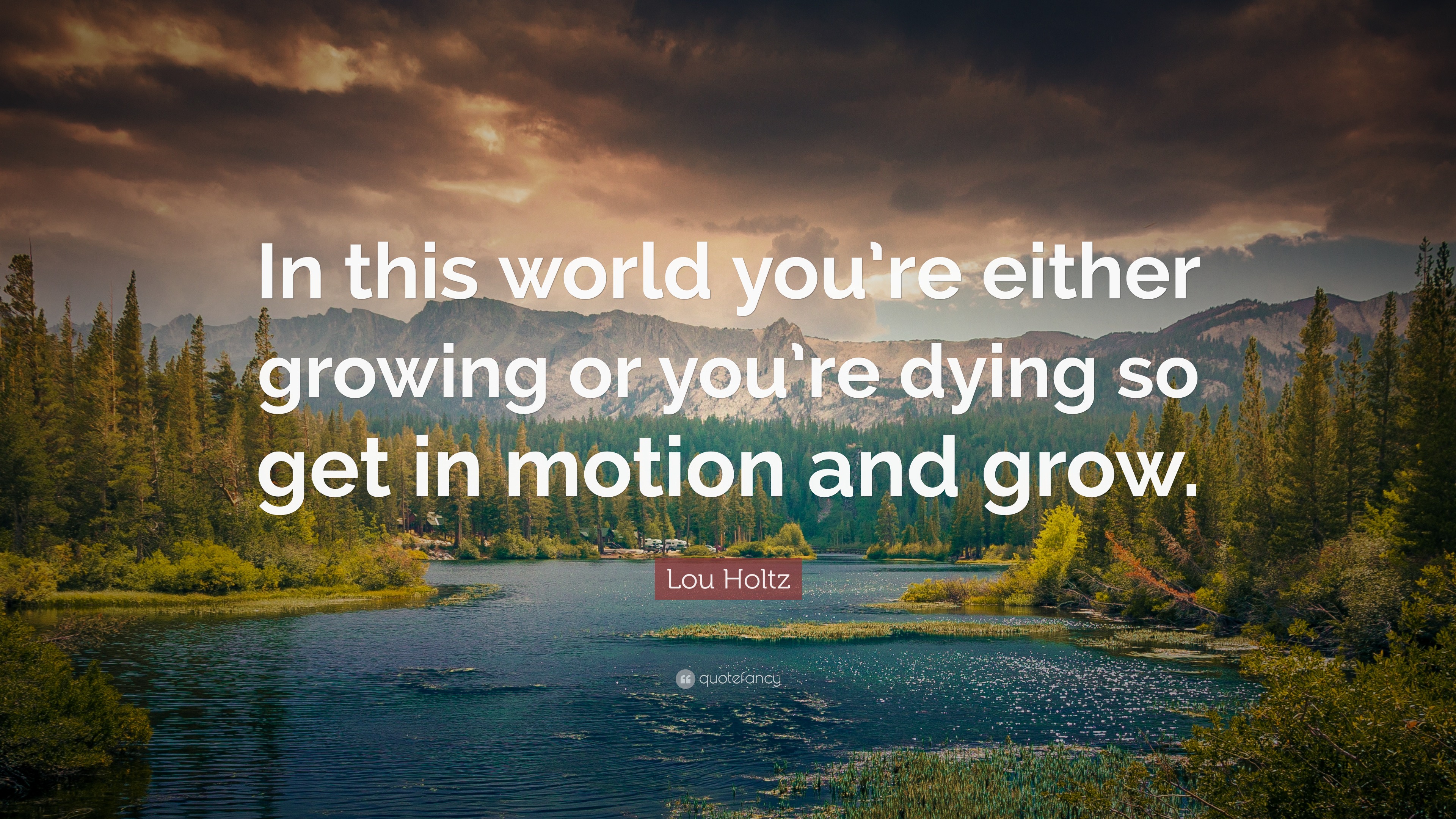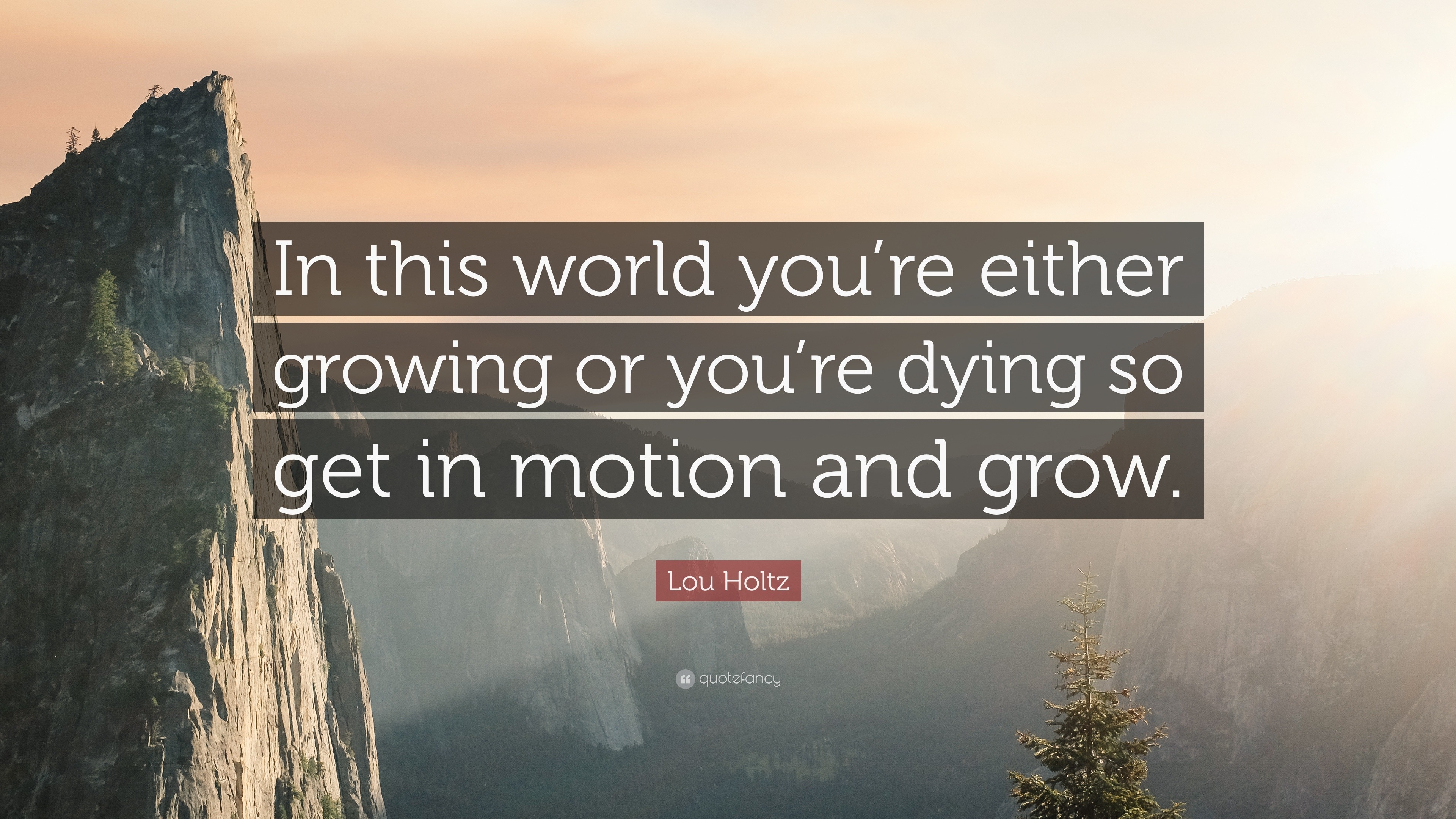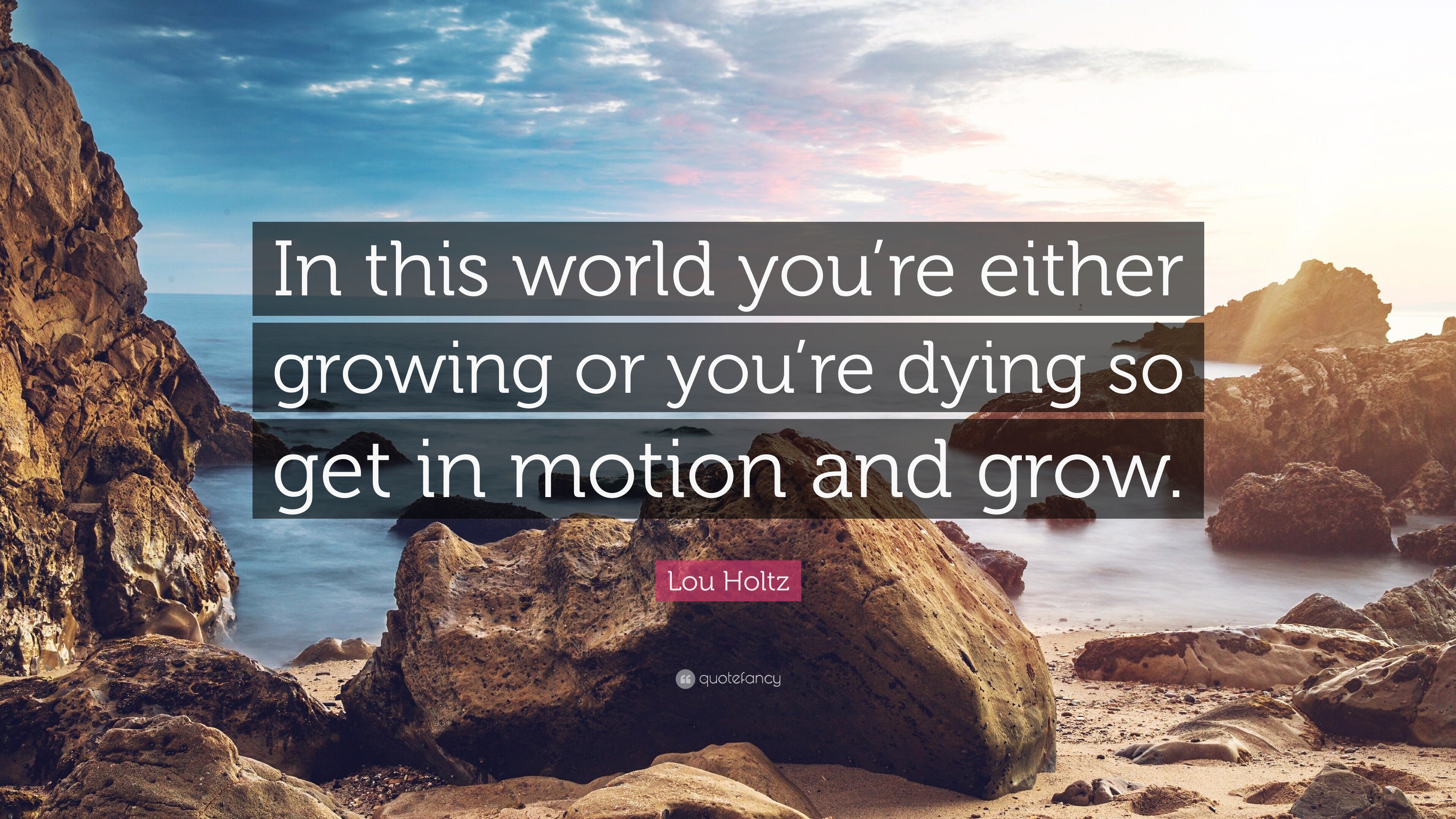If You're Not Growing You're Dying
Rings True for a Vibrant LifeThere’s a saying that really hits home for many of us:
if you're not growing you're dying
. It's a powerful idea, isn't it? This thought, you know, tends to echo in discussions about how we live our lives, how we develop, and what it means to truly thrive. It suggests a constant movement, a gentle push forward, and maybe a little bit of discomfort along the way.Many folks hear this phrase and immediately feel a connection, almost as if it speaks to a deep, inner sense of purpose. It’s a super popular saying in personal growth and leadership development circles, that is that, I'm sure we've all come across it at some point. It makes you think about whether you are moving ahead or just standing still.
But what does it really mean, this idea of continuous growth, and why does it feel so important? We’ve all heard the saying, "if you don’t grow, you rot," but what does that truly suggest for our everyday existence? This piece explores the significance of continuous growth, and how it can, you know, shape our experiences.
Table of Contents
- The Whisper of Tony Robbins and the Addiction to Growth
- What Does It Really Mean: If You're Not Growing You're Dying?
- Why Growth Matters for Your Whole Self
- The Fear of Discomfort: A Hidden Barrier
- Growth vs. Maintenance: Finding the Balance
- Growing Your Faith: A Sustaining Force
- Practical Steps to Embrace Continuous Growth
- Frequently Asked Questions About Growth
The Whisper of Tony Robbins and the Addiction to Growth
When we talk about the idea that
if you're not growing you're dying
, it's hard not to think of Tony Robbins. He's someone who, you know, really champions this concept. My text mentions that Tony Robbins himself says that if you’re not growing, you’re dying. This perspective, apparently, fuels his own approach to life.It’s almost as if he’s, well, addicted to growth, isn't it? He seems obsessively focused on learning, understanding, and mastering new things. This includes everything from, say, finance to perhaps even new ways of thinking about human behavior. This drive, you know, suggests that for him, stagnation simply isn't an option. It's a rather intense way to live, but it does highlight the core message.
For someone like Tony Robbins, personal growth, not some grand strategy, is the very key to success. He believes that when we’re growing, we’re expanding what’s possible for ourselves. This continuous push, you see, allows us to keep discovering new abilities and reaching new heights, which is quite inspiring, honestly.
What Does It Really Mean: If You're Not Growing You're Dying?
The saying
if you're not growing you're dying
isn't, you know, meant to be taken literally in a physical sense. It's more about a state of being, a way of approaching life. It suggests that without forward movement, without learning new things or adapting, we might start to feel stuck, or perhaps a little bit lifeless in our spirit.Think about it like this: a plant that stops growing eventually withers. It doesn't just stay the same, does it? In a similar way, for people, a lack of new experiences or fresh perspectives can lead to a feeling of stagnation. It's about having the wonder of a child, that kind of open curiosity, which is, you know, rather important for staying vibrant.
It’s a powerful metaphor, really. It implies that every day you’re not pushing yourself to evolve, you’re falling behind in some way. The growing simply allows you to not be dying for a little bit longer, to be honest. This idea, you know, reinforces the concept of experiencing life fully, rather than just passively existing.
Why Growth Matters for Your Whole Self
So, why is this continuous movement so important for us? Well, for one thing, personal growth is, in many ways, the very key to success, as my text points out. It’s not just about getting ahead in your career, you know, or achieving certain goals. It's about expanding what you believe is possible for yourself.
When we grow, we are, in a way, expanding our own personal boundaries. We learn new skills, gain different insights, and see the world from fresh viewpoints. This process, you know, makes us more adaptable and more capable of handling life’s twists and turns. It feels pretty good, too, to know you're making progress.
Moreover, growth can put you firmly on the path to becoming the person you were, perhaps, meant to be. It’s about fulfilling your potential, which is a rather inspiring thought. This continuous development helps us discover strengths we didn't know we had, and that, you know, can be truly transformative.
The Fear of Discomfort: A Hidden Barrier
One of the biggest things that can hold us back from growing is, you know, the fear of discomfort. Stepping outside of what we know, trying something new, or facing a challenge can feel a bit scary. It’s a natural human reaction, isn't it, to want to stay in our comfort zones?
But my text suggests that if you’re not actively growing, you’re slowly dying, and this often happens because you’re letting the fear of discomfort hold you back from your true self. It's a rather stark reminder that staying still, while seemingly safe, can actually limit us in profound ways.
Overcoming this fear means, in some respects, embracing the idea that growth often comes with a little bit of unease. It means pushing yourself to evolve, even when it feels a bit strange or difficult. That feeling, you know, is often a sign that you're on the right track, moving towards something new and better.
Growth vs. Maintenance: Finding the Balance
Now, it’s important to acknowledge a rather interesting take on this whole idea. My text points out that there’s nothing wrong with just existing sometimes, and not everything you do will be explicit growth. Some things, you know, are simply maintenance, and sometimes doing just that is enough.
This perspective offers a bit of balance, doesn't it? It reminds us that life isn't always about constant, dramatic leaps forward. Sometimes, taking care of ourselves, maintaining our current skills, or simply resting can be just as important. It’s like a garden; you need to plant new seeds, but you also need to water and weed what’s already there.
So, while the idea that
if you're not growing you're dying
pushes us to evolve, it also leaves room for periods of calm. It’s about finding a rhythm, you know, where you push yourself when needed, but also allow for times of consolidation and care. It’s a very sensible approach, honestly, to a rather intense concept.Growing Your Faith: A Sustaining Force
Beyond personal skills and career advancement, growth can also take on a deeper, more spiritual dimension. My text mentions that a book can be designed to help you grow a faith that can sustain you through life's greatest challenges. This points to a kind of growth that provides inner strength and peace.
For many, this spiritual growth is just as vital as any other kind. It’s about developing a belief system or an inner compass that helps you navigate difficult times. This kind of growth, you know, offers a foundation, a steadying presence when everything else feels uncertain.
It’s about putting yourself firmly on the path to becoming the person you were, perhaps, designed to be, in a more holistic sense. This often involves quiet reflection, acts of kindness, and a consistent effort to live by certain values. It’s a very personal journey, to be honest, but one that offers profound rewards.
Practical Steps to Embrace Continuous Growth
So, how can we actually put this idea of continuous growth into practice in our daily lives? It doesn't have to be a huge, overwhelming change, you know. Small, consistent steps can make a big difference.
Here are a few simple ways to encourage your own growth:
Read and Learn Regularly: Pick up a book, listen to a podcast, or watch a documentary on a topic you know little about. Even just a little bit of new information each day can add up. Learn more about personal development on our site.
Seek New Experiences: Try a new hobby, visit a place you've never been, or meet someone with a different background. These experiences, you know, broaden your perspective and challenge your usual ways of thinking.
Reflect and Journal: Take time to think about your experiences, what you learned, and how you could have done things differently. Writing it down can really help you see patterns and areas for improvement, which is, you know, pretty helpful.
Embrace Challenges: Instead of avoiding difficult situations, try to see them as opportunities to learn and grow. Every challenge overcome, you know, builds resilience and confidence. You can find more helpful advice here.
Ask for Feedback: Ask trusted friends, family, or colleagues for honest input on your strengths and areas where you could improve. This takes courage, but it's a very direct path to understanding yourself better. For more insights on this, you might find this article on receiving feedback helpful.
Practice Self-Compassion: Growth isn't always linear, and there will be times when you feel stuck or make mistakes. Be kind to yourself during these moments, and remember that setbacks are a part of the process. It's almost, you know, like a gentle reminder to keep going.
Remember, the goal isn't perfection, but rather a consistent effort to move forward. It’s about having the wonder of a child, that constant curiosity about the world and your place in it. This continuous striving, you know, allows you to feel more alive and engaged with life.
Frequently Asked Questions About Growth
Here are some common questions people often have about this idea of continuous growth:
Is it true that if you’re not growing you’re dying?
While it’s not meant to be taken literally, the saying suggests that without continuous personal development and new experiences, one might feel a sense of stagnation or a lack of vitality in their life. It's a metaphor for staying engaged and active in your own development, you know, rather than just passively existing.
What does "if you don't grow, you rot" mean?
This phrase means that just like a plant that stops growing and begins to decay, a person who stops learning, adapting, and seeking new experiences might feel their spirit and potential diminish. It highlights the importance of staying dynamic and open to change, which is, you know, quite important for well-being.
Why is continuous growth important for success?
Continuous growth is important because it expands your capabilities, helps you adapt to new situations, and broadens your perspective. My text suggests that personal growth, not some master strategy, is the key to success because when we’re growing, we’re expanding what’s possible for ourselves. This ongoing development, you know, helps you reach your full potential in various aspects of life.
So, as we consider the idea that



